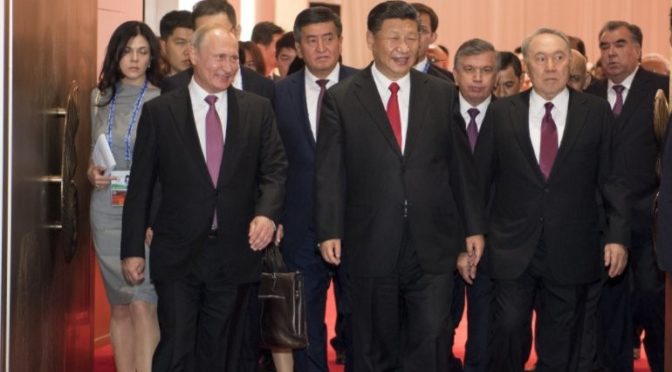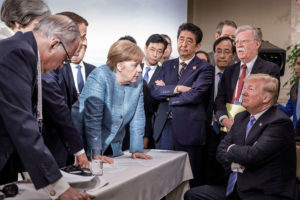The ‘Shanghai Spirit’
Posted on : June 20, 2018Author : AGA Admin


The 18th Shanghai Cooperation Organization summit held in Qingdao (China) with India and Pakistan as full members was attended, among others, by the Indian Prime Minister Narendra Modi and Pakistan President Mamnoon Hussain. A euphoric Chinese media hailed it as a commitment to multilateralism by more than half of the global community and a reiteration of the ‘Shanghai spirit’ based on mutual benefit, equal consultation, respect for diverse civilizations and pursuit of common development. Reflecting this positive note the global media highlighted the sharp contrast between two iconic images, one from the G7 meeting in Charlevo is (Canada) of a defiant US President confronting a combative Angela Merkel juxtaposed against the smiling SCO group led by Chinese President Xi and Russian President Putin. While the US President instructed US representatives not to endorse the G7 final statement the SCO was reported to have managed an ‘almost’ unanimous one with India opting out of extending support to the Belt and Road Initiative and non -signatories opting out of support for non-proliferation. A ‘breaking apart of the West’ and a ‘consolidating East’ dominated headlines and was identified as the marker of the emerging global scenario.
What remained unsaid is that not just the optics, but by nature the two organizations (apart from being groups of states led by global leaders) are different in nature. What is now the G7 began as a gathering of financial officials in the wake of the 1973 oil crisis. The first summit brought together France, West Germany, Italy, Japan, the United Kingdom and United States who were joined in 1976 by Canada. The group represented the world’s top economies united by the so called liberal world order and democratic government. Russia’s addition was an ambitious exercise which ended ostensibly with the annexation of Crimea but mostly because Russia did not ascribe to the political culture of the rest of the group. The G7, while formalized in annual summits remains a gathering of global leaders with shared interests and influence in global affairs. The SCO, a more institutionalised organization that emerged with the intent of settling border disputes between China and the newly independent Central Asian states of Kazakhstan, Kyrgyzstan and Tajikistan, developed as a mechanism to deal with an ever expanding domain from trade to terrorism and culture. As its ambit increased so did its membership of associated states. Reflecting a ‘new normal’ in international relations, it today includes as its ‘dialogue partners’ states as geographically separated as Azerbaijan, Armenia, Cambodia and Nepal reflecting economic diplomacy supported by large scale infrastructural projects and economic corridors that seems to be the hallmark of global politics today.
For a number of years the inclusion of India and Pakistan as permanent members of the SCO had been withheld as there was apprehension that the conflicting positions of the two South Asian neighbours on a number of issues would negatively affect the functioning of the organization. Their entry this year as full members was seen to hail a new era, not only for multilateralism but also in terms of their bilateral relations. Chinese Foreign Minister Wang in the weekend following the summit remarked
“We know there are existing and historical, unresolved issues and conflicts between Pakistan and India. But I think after their joining of the SCO, maybe we can say that their relationship might be better as the grouping provides a better platform and opportunities for building the relations between them. Because, when joining the SCO, a series of agreements had to be signed and pledges had to be made. One of the key pillars (of joining the SCO) is to keep good and friendly relations and they should not see each other as opponents, much less enemies. Because they have signed these agreements, they shoulder a responsibility for implementing them.”
The reference is to the series of multilateral meetings on various issues attended by India and Pakistan that preceded the summit. Whether this heralds a new era of informal diplomacy, to deal with contentious bilateral issues that reflect deep national concerns and interests, remain to be seen, however it does reflect Chinese aspirations to be the ‘conscience keeper’ in the region. Similarly, comments in the Global Times that the SCO provides “multilateral guarantee” for India’s connectivity with Central Asia via Pakistan is a reflection of China’s involvement in global affairs, with the aim of building a global community of shared interests and responsibility through transport and trade corridors
This consensus on the building of a global community of shared interests, at least as far as the SCO is concerned is mainly determined by China and Russia which while differing over the exact purpose and scope of the organization have shared positions that was echoed in both Xi and Putin’s statements. It was also reflected in the fact that despite the expanded presence the two official languages of the organization remain Russian and Chinese. The SCO and the emerging confluence of the Eurasian Economic Community with the BRI is also the effect of the emerging trade war between China and the United States on the one hand and the fact that Moscow has been at odds with Washington particularly since the Ukrainian crisis when diplomatic and economic sanctions were imposed against Russia by the West led by US. Moscow’s tensions with Washington have also intensified in the Middle East. In this background Sino Russia relations have taken a positive spin. And this in turn is echoed in the absolute unity behind Chinese endeavours by declarations supporting the Belt and Road Initiative in recent SCO summits.
Fresh initiatives in Sino Indian ties were seen as another positive aspect in the backdrop of China’s trade war with the US. BRICS and SCO have been identified as the two multilateral institutions through which Sino-Indian relationship would progress. The June 9 meeting between Modi and Xi on the sidelines of the SCO summit was noted to have covered key aspects of the bilateral engagement reflecting the resolve of the two countries to reset their relations and bring ‘trust’ back to their ties. The meeting was said to have been held in a cordial atmosphere with the promise of high level exchanges, new trade goals and people to people exchanges led by the two foreign ministries. A new trade target, an agreement on continuing to share hydrological date on the Brahmaputra, enhancing agricultural exports including non-Basmati rice, was some of the official takeaways from the summit. Critics however commented on the fact that China has already constructed three dams on the Brahmaputra, making the sharing of hydrological data a formality and that a market for non-Basmati rice will first have to be created in China before there is scope for export.
Reports from China indicate that through the ‘Shanghai Spirit’ that transcends concepts of the clash of civilizations, a ‘new world order’ is in the making. Proposed by a China, with increased involvement in global affairs, it aims to build a global community of shared interests and responsibility through economic corridors. The corresponding reduced emphasis on the sanctity of sovereign limits, that the proposed large scale logistical arrangements would necessarily entail, however, brings with it debates on how this would change the rules of the game as far as global influence is concerned.
Anita
20 June 2018





Leave a Reply